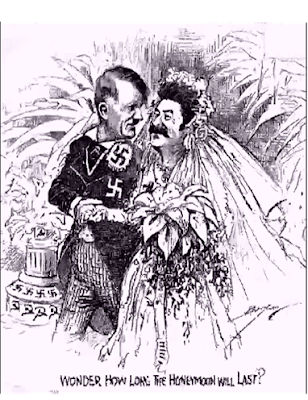Reagan is not the only reason the Soviets failed..
Of course this is true. Margaret Thatcher, Lech Walesa, John Paul II, Vaclav Havel, Aleksandr Solzhenitsyn, etc. - each played an important role. Most vital, millions of ordinary people stood up to Communist dictatorships. I am only saying Reagan's foreign policy was the best in the Cold War era.
Another quote from the article you linked to:
But much can be said for
Reagan's Evil Empire speech, not to mention the decision to
employ Pershing missiles in Europe, as attention-getting wakeup calls to the Soviet leadership. Edwin Meese, attorney general and close confident of Ronald Reagan, argues in his Reagan-era memoir that the Russian leadership, before and after the arrival of Gorby'achev, became convinced that Reagan's pedal-to-the-metal arms' buildup, particularly is proclaimed interest in the Strategic Defense Initiative or, as proclaimed by foes in the press and Congress,
"Star Wars," would lead to further disruption in the Soviet economy. In order to keep up and build their own or a similar project economic bankruptcy might well ensue.
Peter Schweizer, a Hoover Institute Fellow, has devoted an entire book, to demonstrating how decisive Reagan's anti-Communist strategy was in bringing down the "Evil Empire." While much of the book amounts to a celebration of William Casey's ability to strike a blow at the enemy via his fabled access to Reagan and his CIA leadership prerogatives (constant trips throughout the world on a secret black-painted CIA airliner are highlighted), it nevertheless develops a credible scenario, if not for the single-handed toppling of the Soviet Union, at least for providing a push sufficient to help tumble it into history's much remarked upon dustbin.
To Schweizer, Casey, always with Reagan's imprimatur to back him up, is able to work wonders, in some cases simply through his banking and big business contact. He is able, for example,
to quash low-interest loans to the Soviets; to clamp down on the export of Western technology the Russians are employing to maintain their crumpling industrial base; to make it tougher for the Russians to complete a huge natural gas pipeline that would, if ever properly completed, provide them with much-needed Western hard currency; and finally through astute jawboning and clever parceling out of quid pro quos in the form of military intelligence and high-tech weaponry to strategic allies, especially the Saudis, the United States is able to convince the latter
to substantially increase oil production and thus in one blow enhance the American economy by reducing oil prices while concurrently devastating the Soviet Union's major source of income, namely their export of petroleum.
This American-induced drop in oil prices also makes it more difficult for purchasers of Soviet arms such as Iraq, Iran, and Libya to continue their brisk acquisition of high-tech Soviet weaponry, thus leading to a further diminishment of Soviet income. Furthermore, large planned industrial projects such as a Renault car factory, two British chemical plants, and the purchase of Japanese and U.S. machinery are forced to be scrapped for lack of hard currency.
But it's the specter of SDI that apparently had become a major fixation in the minds of both the Soviet strategic defense hierarchy as well as Gorbyachev himself. Not only do Reagan defenders point this out, but much of the evidence stems from reports provided by the Russian leaders themselves. From wiley old Andrei Gromyko to highly-ranked Soviet army officers to KGB officials, the assumption early on was that it was Reagan's intent to wreck the Soviet economy on the shoals of the arms race.
And to Gorbyachev it was becoming increasingly clear that in order to reform the Soviet economy it first would be necessary to reduce substantially the enormous expenditure going to their military-industrial complex. In fact, the impromptu Iceland Summit in 1986 in large measure centered on Gorbyachev's attempt to convince Reagan of the importance of scrapping SDI.
One theory is that following Khrushchev's embarrassment over the pullout of missiles from Cuba, the Soviet's full-speed-ahead military buildup provoked the West into a competition that was unwinnable for the Soviet side. Laqueur quotes
Valentin Falin, former Soviet ambassador to Germany, who, in speaking apropos of the arms race, said that "Detente would never have resulted in the tearing down of the Iron Curtain."

